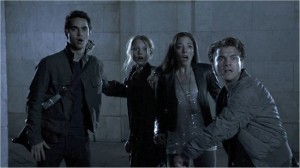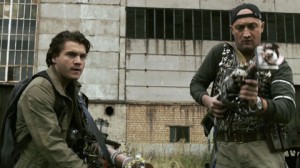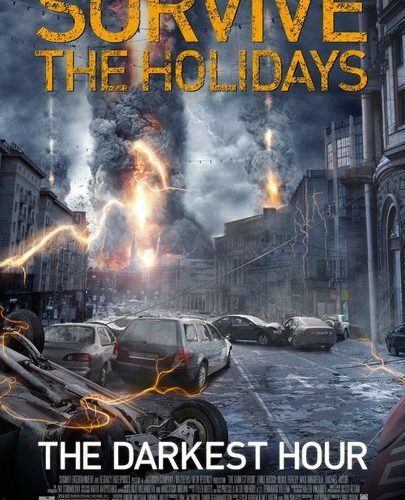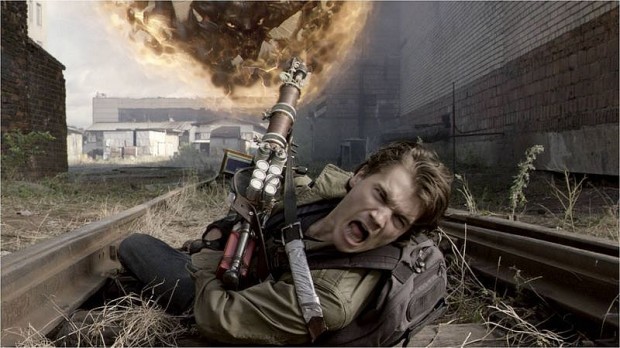The Darkest Hour has a very enigmatic moniker; the title could be referring the the fact that this movie takes place in a Moscow that has been drained of all electricity following an alien attack. It could be referring to the fact that the events unfolding depict humanity’s most dire moment. Conversely, it could be trading in on the old adage that it is always darkest before the dawn. In that way, more probably (and yet, most likely, less intentionally) the title could be referring to the actual first hour of this sci-fi action thriller. For what begins as a rote, uninspired journey filled with stock characters making bad decisions soon gives way to a bright, beaming sun of inspired madness – a sun that might, oddly, save this film from becoming just another completely wasted opportunity.

We begin with two American entrepreneurs, friends since grade school, arriving in Moscow to pitch their new social networking service to a prominent tech company. Sean, played with game nonchalance by Emile Hirsch, is a callow, devil-may-care kind of man, while his friend Ben, given more pathos than he deserves by Max Minghella, is a tightly wound and ambitious businessman. When their deal falls through, Sean surmises that a trip to a nightclub to court some Russian models is exactly what they need. There, they meet fellow American Natalie (a par for the course Olivia Thirlby) and her Australian compatriot Anne, invested with stark ambiguity by Rachel Taylor.
The group can barely get a drink down before disaster strikes. As the lights go out, the entirety of the bar crowd moves outside to see the night sky filled with a strange aurora. As ethereal lights descend and land on buildings and roads alike, a sense of cautious awe stirs among the throng of revelers. When a policeman is turned to dust by a now-invisible orb of power, chaos breaks out.
From here the film turns into a fairly mediocre exercise in genre terror. The characters take any moments of safety they get as an opportunity to expound upon their lives and their pasts, while all of the action beats involve them screaming and running and hiding. There’s some tension to be wrung from these scenes, and director Chris Gorak (of the devilish thriller Right at Your Door) proves himself capable of staging and executing action scenes with ease. Still, the characters make stupid choices and find themselves in harm’s away again and again by dint of their poor decision making skills, and in spite of their character exposition they never find a third dimension to inhabit. (Fitting, as the film is being show in thoroughly unspectacular 3D.)

For too long we watch them trek pointlessly around the city, sharing banal stock-dialogue with one another while hopping from incident to incident. But then, just when the audience has become complacent, The Darkest Hour deploys a sudden, unexpected, and unending parade of bizarre, inspired weirdness that baffles and inspires in equal measure. The movie, to this point, had been a cliched, straight-laced, reality-grounded tale of strangers surviving a strange attack in a strange land. Here, though, it becomes a batty, campy, engaging story of the many and varied ways in which other survivors have begun to stage their rebellion. To give even a hint of what lies in store would be a travesty. Let it suffice to say that I was confused, knocked off guard, and then wholly enamored with the sharp left turn the movie took in its final stretch, and I wish that it had embraced this weird energy long ago.
Sure, the American heros (maybe even the actors themselves) seem confused by the sudden shift in tone, but what does that matter? The string of Russian characters we get in the final half-hour are infinitely more compelling and arresting than those young professionals ever could be. It’s enough to make you yearn for a tie-in comic, or novelization. It’s just too bad that the film makers didn’t realize that this ragtag squad of guerrillas was the real draw of this story, so they could have more quickly dropped the attempt at gravitas in favor of exploring this oddly compelling post-apocalyptic army.
Is this final act enough to warrant a recommendation? I can’t really say. Mediocrity is not repellent on its own, and as such the first two acts aren’t in and of themselves a reason to dissuade curious viewers. As I’ve covered, the film is competently made and does have moments of interest, and at just about an hour and a half long it doesn’t require much time investment. However, those final scenes where the movie kicks off it shoes and really makes up its mind to do something special are enough to make you thankful you saw it, but also regret that it didn’t resolve to tread that path right from the start.
The Darkest Hour hit theaters December 25th, 2011.


